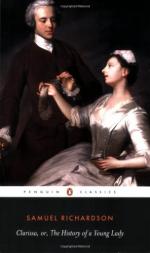My Lord and I both joined in the wish: and ’faith I wished it most cordially.
The Colonel read the letter twice over, and then returned it to me. ’Tis all a mystery, said he. I can make nothing of it. For, alas! her friends are as averse to a reconciliation as ever.
Lord M. I could not have thought it. But don’t you think there is something very favourable to my nephew in this letter—something that looks as if the lady would comply at last?
Col. Let me die if I know what to make of it. This letter is very different from her preceding one!—You returned an answer to it, Mr. Lovelace?
Lovel. An answer, Colonel! No doubt of it. And an answer full of transport. I told her, ’I would directly set out for Lord M.’s, in obedience to her will. I told her that I would consent to any thing she should command, in order to promote this happy reconciliation. I told her that it should be my hourly study, to the end of my life, to deserve a goodness so transcendent.’ But I cannot forbear saying that I am not a little shocked and surprised, if nothing more be meant by it than to get me into the country without seeing her.
Col. That can’t be the thing, depend upon it, Sir. There must be more in it than that. For, were that all, she must think you would soon be undeceived, and that you would then most probably resume your intention— unless, indeed, she depended upon seeing me in the interim, as she knew I was arrived. But I own I know not what to make of it. Only that she does me a great deal of honour, if it be me that she calls her dear blessed friend, whom she always loved and honoured. Indeed I ever loved her: and if I die unmarried, and without children, shall be as kind to her as her grandfather was: and the rather, as I fear there is too much of envy and self-love in the resentments her brother and sister endeavour to keep up in her father and mother against her. But I shall know better how to judge of this, when my cousin James comes from Edinburgh; and he is every hour expected.
But let me ask you, Mr. Lovelace, what is the name of your friend, who is admitted so easily into my cousin’s presence? Is it not Belford, pray?
Lovel. It is, Sir; and Mr. Belford’s a man of honour; and a great admirer of your fair cousin.
Was I right, as to the first, Jack? The last I have such strong proof of, that it makes me question the first; since she would not have been out of the way of my intended visit but for thee.
Col. Are you sure, Sir, that Mr. Belford is a man of honour?
Lovel. I can swear for him, Colonel. What makes you put this question?
Col. Only this: that an officious pragmatical novice has been sent up to inquire into my cousin’s life and conversation: And, would you believe it? the frequent visits of this gentlemen have been interpreted basely to her disreputation.—Read that letter, Mr. Lovelace; and you will be shocked at ever part of it.




